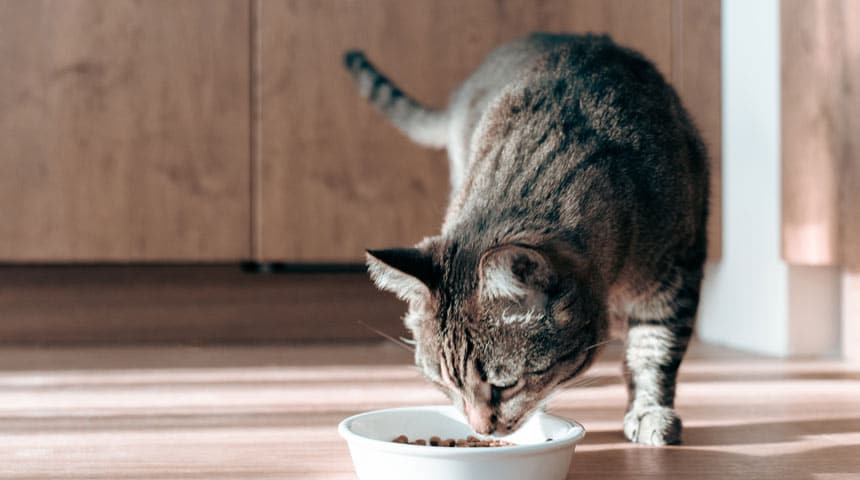
How to Choose the Best adapted Food for Your Pet?
Today, there are many different types of food to meet your pet’s needs and health conditions. While it’s great that our pets can benefit from specially adapted food, with so many choices available, it can be hard to keep track. Here’s some useful information to help you make the right choices.
To Support Digestive and Immune Health
This type of food helps prevent gastrointestinal problems and ensures improved nutrient absorption, thus guaranteeing that our pet derives maximum benefit from every meal.
It contains prebiotics and specific fibre that help maintain a healthy intestinal flora. By promoting efficient digestion, these foods help ensure that the animal benefits fully from the nutrients ingested.
And just like us, a healthy intestinal flora contributes directly to a more robust immune system, helping to prevent common illnesses.
To Support Dental Health and Optimal Oral Hygiene
By maintaining an optimal level of oral hygiene, we reduce the risk of periodontal disease while supporting healthy gums and teeth. Good dental hygiene can help prevent oral diseases, which can prove to be very costly and, above all, adversely affect your pet’s quality of life.
That’s why these formulas feature specific active ingredients and textures that help reduce plaque and tartar through mechanical or enzymatic action.
Specific nutrients support gum health, reducing the risk of gingivitis (bad breath!) and other oral issues. And by maintaining good oral hygiene, we prevent potentially costly and uncomfortable diseases for our pet. Because an ounce of prevention is worth a pound of cure!
Food for Young Animals (Kittens, Puppies)
To ensure optimal growth and healthy development in puppies, it’s essential to provide a balanced diet that includes the following elements :
- Protein is critical for growth and muscle development and should form an important part of their diet. Fats provide a concentrated source of energy and are also essential;
- Calcium is essential for the development of healthy bones and teeth and must be available in sufficient quantities to support healthy growth. Phosphorus is also necessary for proper bone growth;
- Vitamins play a fundamental role in puppy health, who have specific requirements in vitamins A, D and E.
- Finally, omega-3 fatty acids, particularly DHA, are important for brain and vision development. Although specific levels of DHA are not always defined, it is recommended to include sources of DHA, such as fish oil, in puppy diets.
For Senior Animals
You should know that your dog is considered senior when it reaches half its life expectancy; therefore, for small breeds this happens around 10 years, medium breeds 8 years, and giant breeds 6 years. For cats, this is around 8 years, depending on the breed.
The nutritional needs of older pets differ from those of younger ones. You should know that specialized foods for seniors are formulated with ingredients known to improve certain frequently occurring problems.
These include glucosamine and chondroitin to help support joints and mobility, and specific antioxidants that can help maintain your old friend’s cognitive functions. Fibre and probiotics to support digestion and prevent constipation are also often added.
In addition, it offers an adjusted caloric intake to prevent excessive weight gain.
Weight Management Food
Although our chubby pet may seem cute to us, it’s imperative to ensure that they return to a healthy weight to optimize their quality of life. A healthy diet and exercise are important allies in achieving this objective. This type of food is low in calories while offering complete nutrition. Often containing special fibre that helps promote satiety and support healthy digestion, these foods also include essential nutrients such as omega-3 fatty acids to support cardiovascular health and joint mobility.
Urinary Health Food
To keep your dog’s urinary tract healthy, it’s essential to choose a food specially designed for this purpose.
This kind of kibble help maintain the correct pH level in the urine, reducing the risk of urinary crystals. They are often enriched with antioxidants and omega-3 fatty acids to give an extra boost to urinary health. As well, some foods control sodium to encourage good hydration.
There are also other types of food that offer specific benefits, such as supporting brain development with essential fatty acids like DHA (docosahexaenoic acid), which promotes cognitive development and brain function. In addition, some formulas are enriched with antioxidants and vitamins to boost the immune system and improve resistance to disease.
In Conclusion…
By working with your veterinarian, who knows your pet well, you can ensure that you choose the most suitable and safe nutrition. Although the investment in quality food may seem high at the outset, it is clear that it considerably improves your companion’s health and well-being in the long term. Remember, a sick pet can involve significant costs. So why not make the right choices today for our beloved four-legged friends? Discover our blog on : The Importance of Quality Food for our animals.

